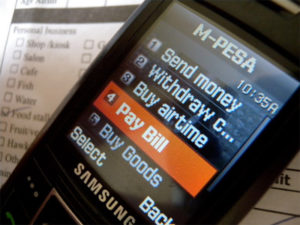Mark Zuckerberg made a surprise appearance in Nairobi last week on a scouting mission. Facebook’s billionaire founder was after the crown jewel in East and Central Africa’s most profitable company, Safaricom: M-Pesa.
Dressed characteristically nonchalantly in a grey T-shirt and blue jeans, Mr Zuckerberg laid out his intentions plainly. “I am here to learn about mobile money.”
And to drive the point home to a group of star-struck journalists and start-up founders on the second floor of Nairobi’s Bishop Magua building, Zuckerberg gently alluded to Kenya’s willful blindness. “For folks who spend a lot of time in the entrepreneurial ecosystem here [in Kenya], it may be hard to appreciate just how advanced the Kenyan system is over others, and I think there are a lot of lessons we can learn to help build services for people in the rest of the world,” he said.
Kenyans depend and spend on M-Pesa with a frequency that is often forgotten. Last year, Ksh14 billion was transacted through M-Pesa. Every day. To put this amount in context, what Kenyans transact in just three days would be more than enough to build another Thika superhighway.
This disruption of the financial and payments system is M-Pesa’s greatest selling point, and is likened to US Silicon Valley disrupters Uber (transport), Airbnb (accommodation) and Facebook (social interaction).
In the last decade, Facebook has moved from a web platform that allows friends and families to keep in touch and share what is happening in their lives, to a company that seeks to exploit the future needs of social network users. Zuckerberg’s most expensive acquisitions, like Instagram, WhatsApp, and Oculus VR, are geared towards linking the social network platform to photo-sharing, instant messaging and virtual reality, respectively.

These are all fertile ground for exploring lucrative advertising models.
And Facebook is aware that the next ‘billionth milestone’ will come from Africa. To this end, the company has ventured into connectivity, signing partnerships with telecommunications service providers like Airtel, through Internet.org, to provide Internet connectivity in poor regions.
NEXT >> Why Mark Zuckerberg ate fish on Kenyan tour
M-Pesa is an innovation of interest for the tech giant and provides two key opportunities for growth and profits: a profitable and growing mobile payments infrastructure, and an additional network of mobile applications connecting more users (and more eyeballs) to the platform.
This is why Zuckerberg’s interest was on how Kenyan start-ups like Twiga Foods ride on M-Pesa to create a sustainable business. “It is very fascinating how they [Twiga Foods] collapse the value chain of delivering produce to people, and in each step of the way you get the sense that it is only possible because you can move money around very efficiently in a way you can’t in other countries, including the US,” he said.
But it is not only Western economies that have failed to master mobile money. Vodacom shut down its M-Pesa division in South Africa in June this year over insufficient traction six years after a colourful launch. MTN, Africa’s largest telecommunications firm, last week announced it had stopped signing up new subscribers onto its mobile money network as it studies the visibility of the product.
Analysts suggest it could be culled from the company’s business. Economist Laura Llewellyn-Jones from the UK’s Institute of Economic Affairs states that M-Pesa has been successful in Kenya because of a perfect combination of exploiting a gap in financial inclusion and an enabling regulatory environment.
[crp]












Let the billionaire include me also.
This is the story most journalists missed. Most of them were more focused on how he ate fish in a restaurant. Who knows what Mark had in mind when he visited the country, we might just be seeing Facebook entering in a partnership with Safaricom.
You May over look this:
But it has the potential to change the world overnight.
Infact the day Facebook signsup MPESA, i will liquidate all my small investments and invest heavily in this company.
This single transaction can easily take out Giants like: e-bay, Alibaba, Amazon, Paypal, Visa, and practically anyone that depends on transactions.
It will make Google checkout seem like child play
Facebook can tweak it a bit and then take it to the world.